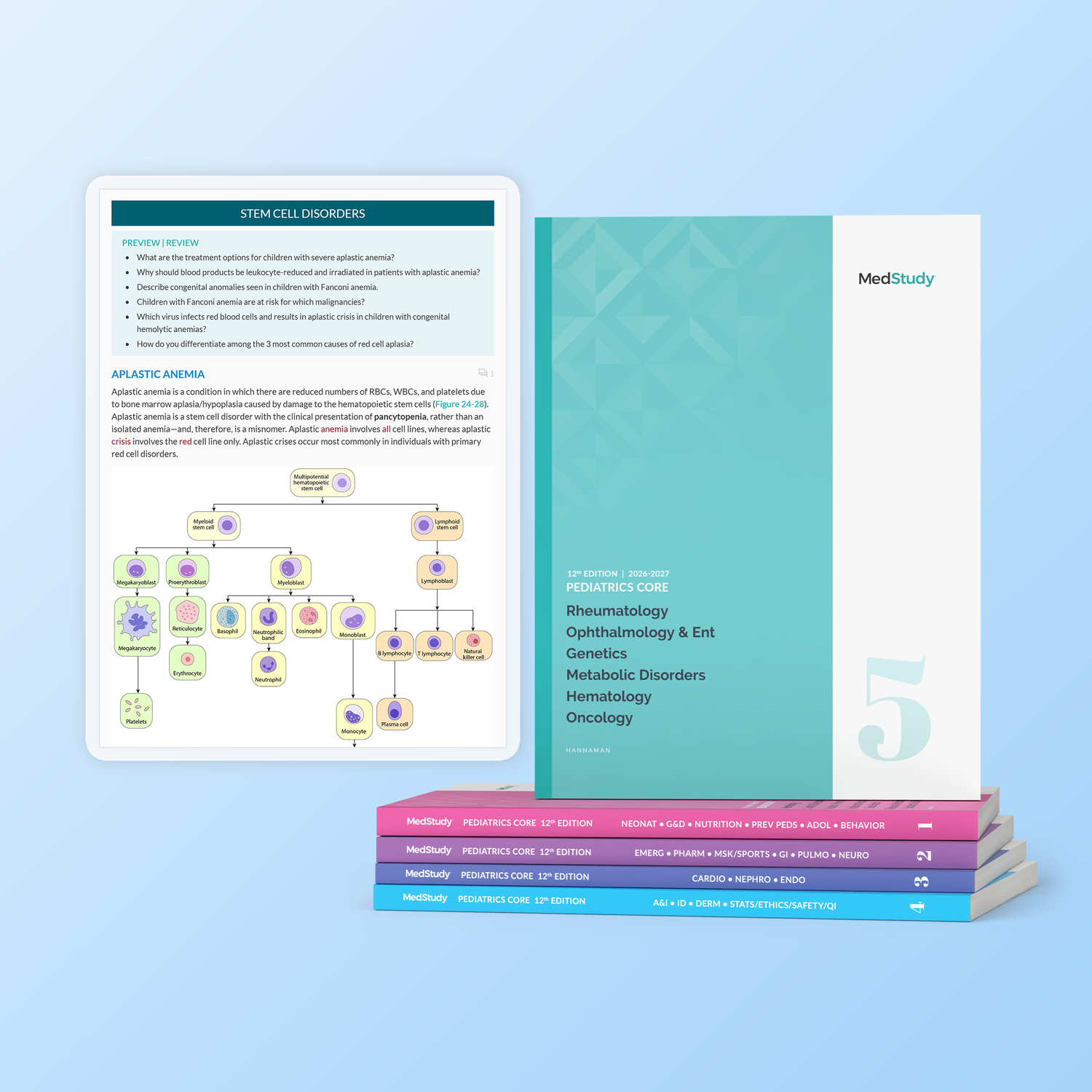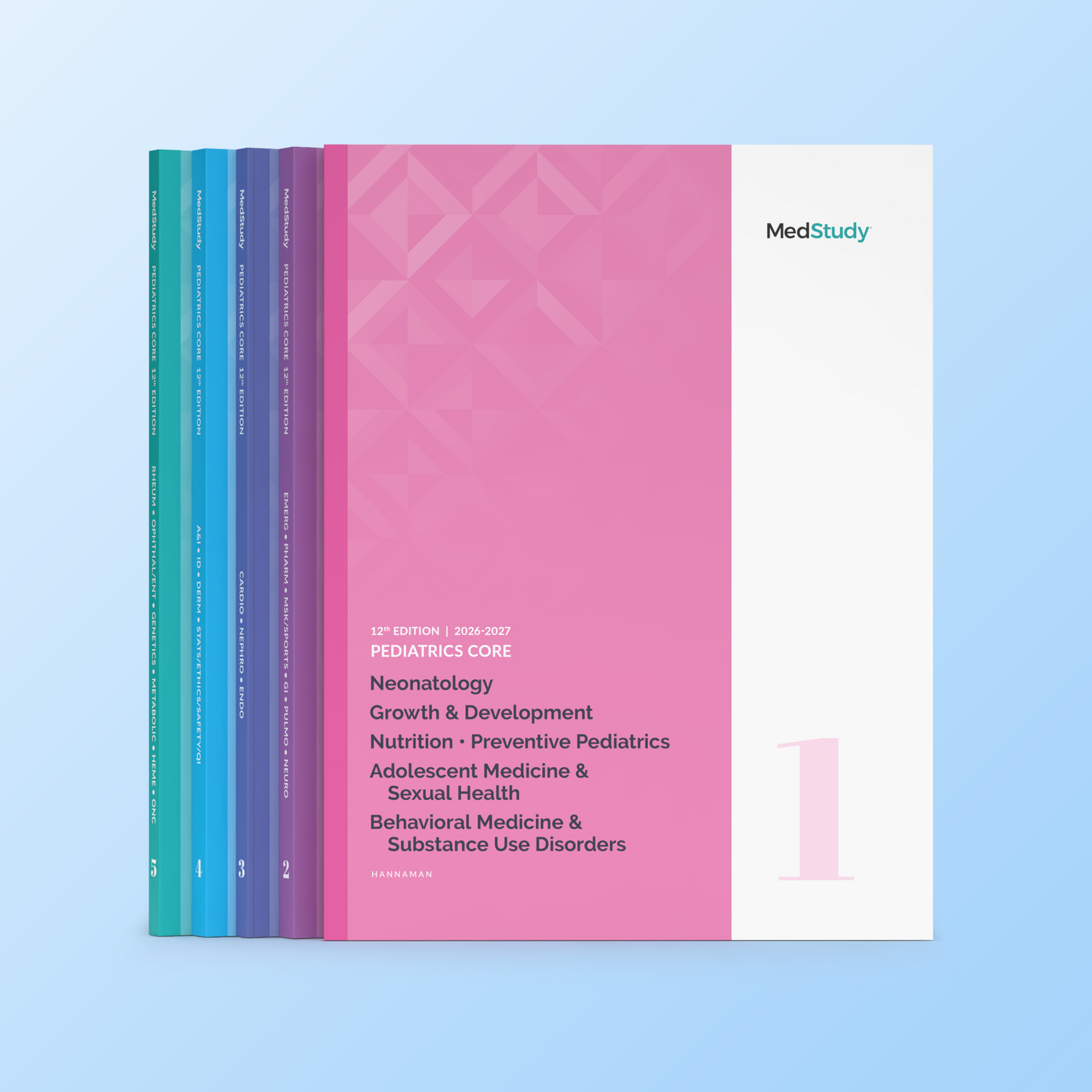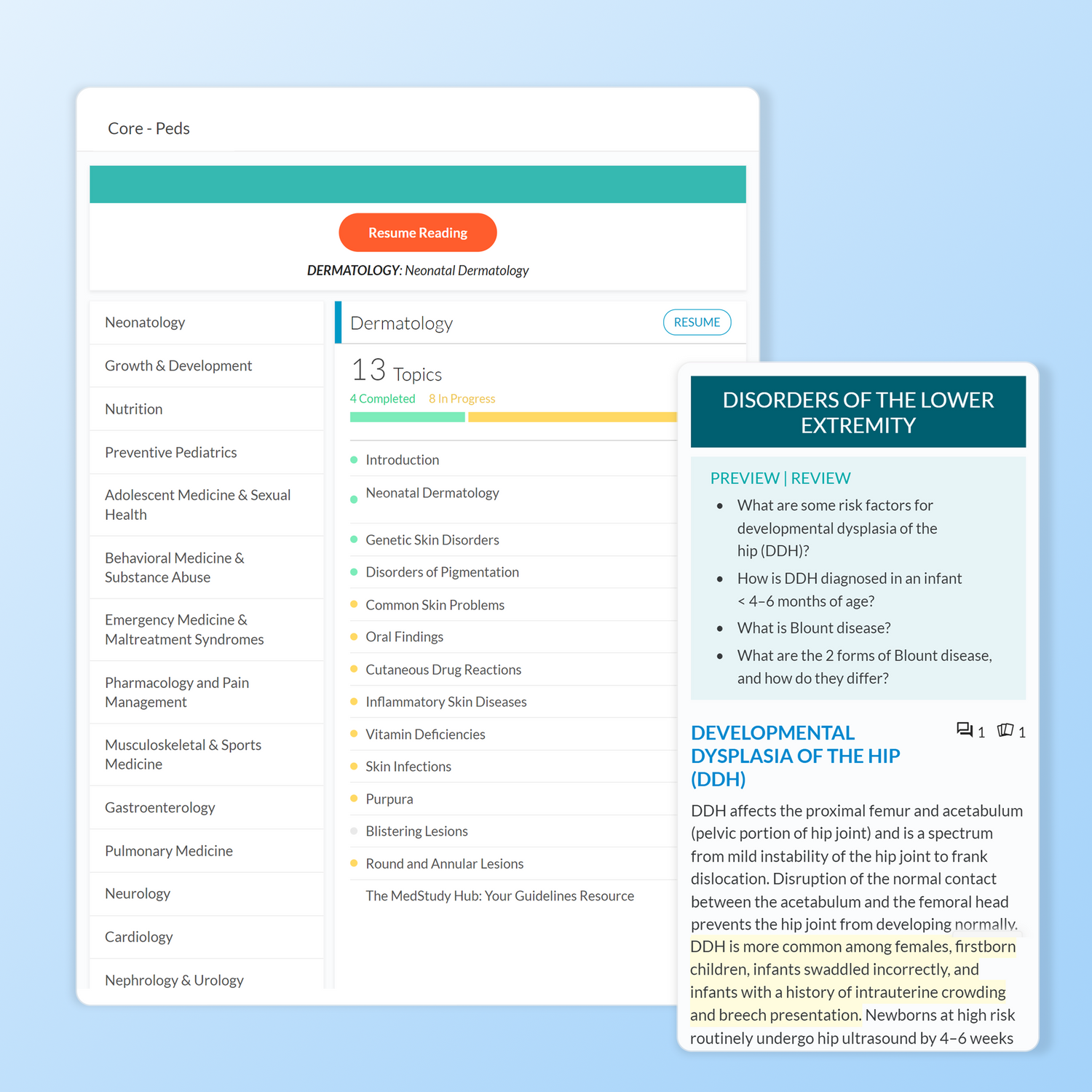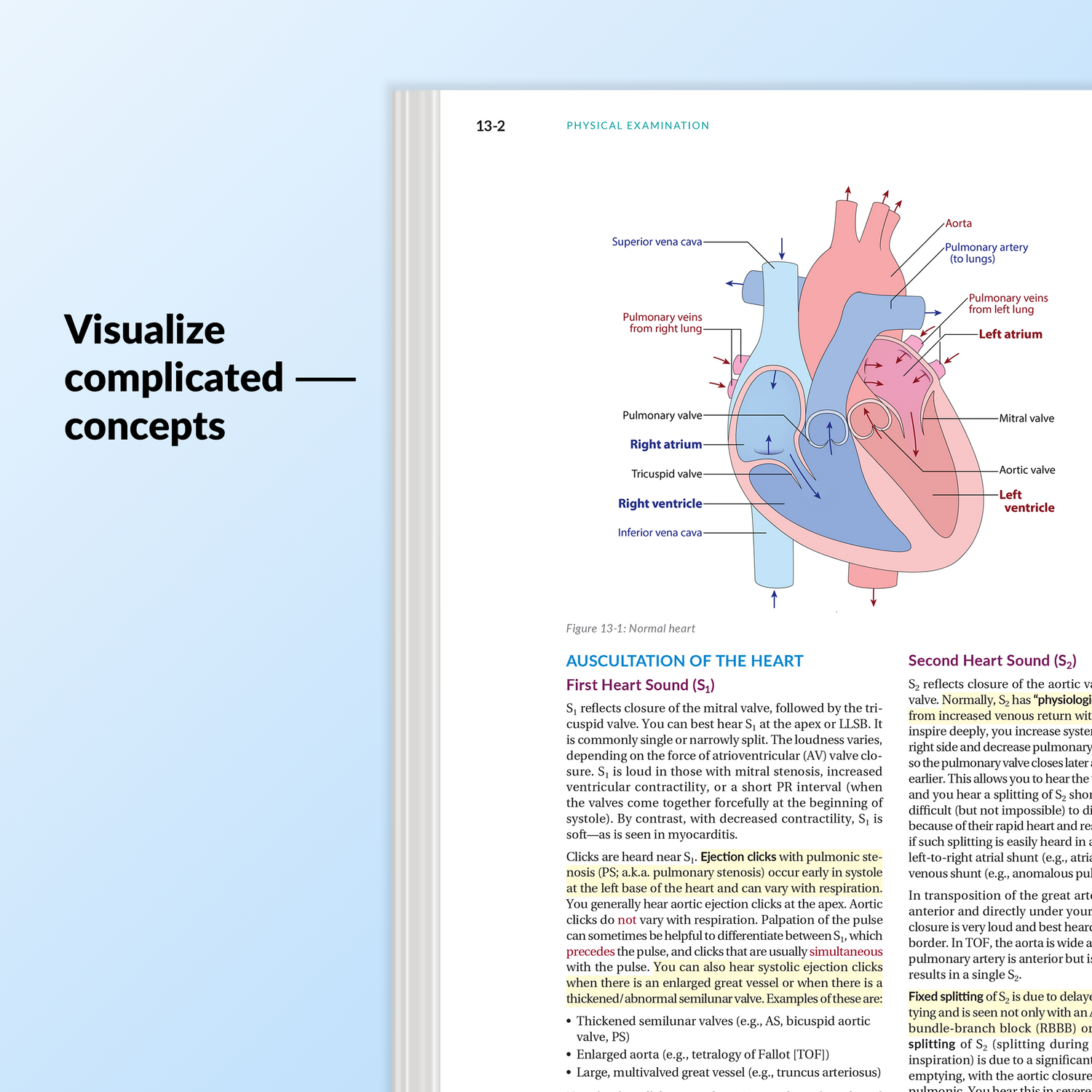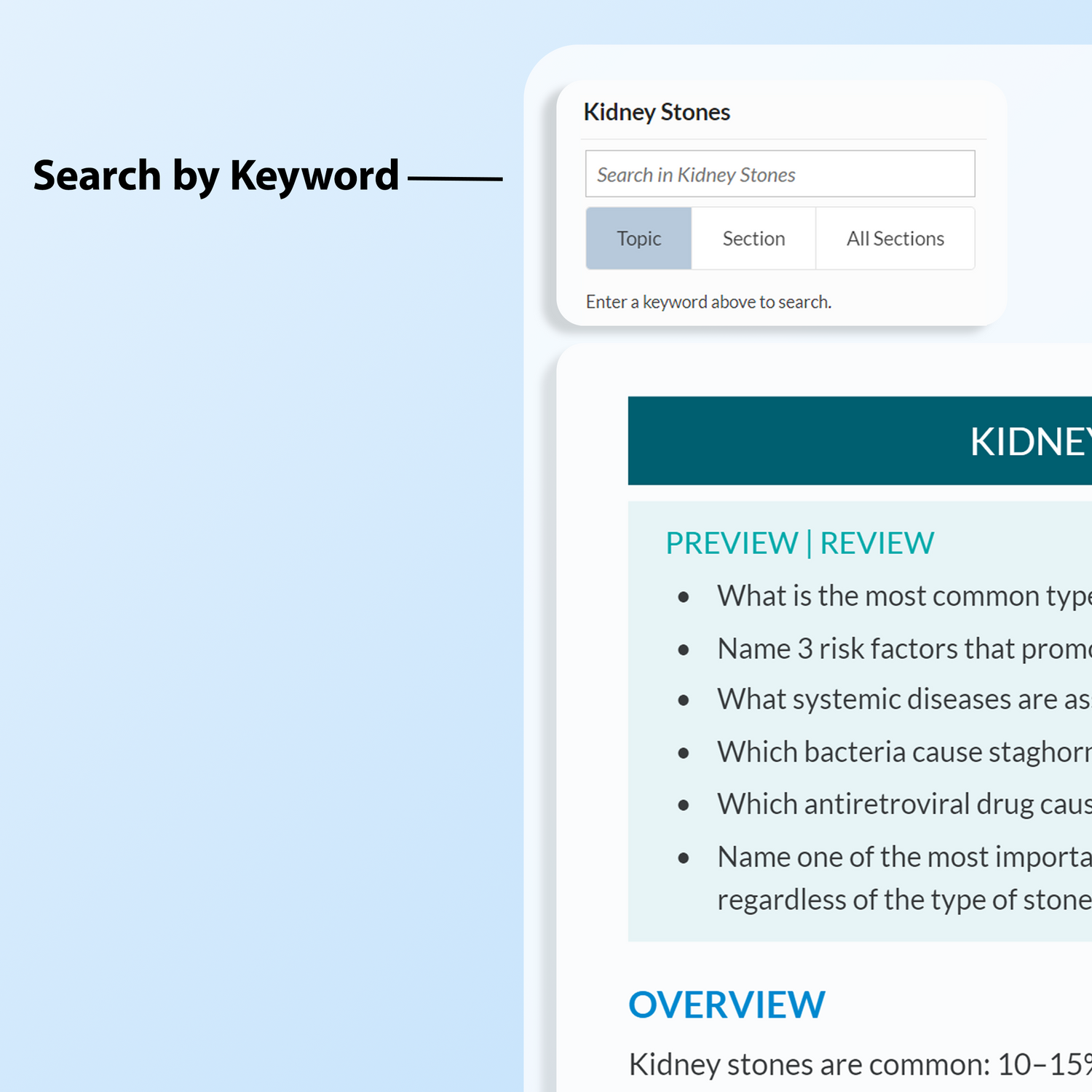Pediatrics Core
New 12th Edition! Everything You Need to Know for the Boards—And Beyond
Our Pediatrics Core is a complete board-prep curriculum, available in print and digital. It’s high-yield, easy to read, and written to help you truly understand pediatrics, not just memorize it.
The Digital Core is always up-to-date, searchable, and connects with Flashcards and Qbank+ for smarter studying.
What's included
- Pediatrics Core (in either print or digital), carefully created according to the ABP content outline
- 2,220+ Preview | Review questions
- 3 years of access to all digital Core content
- Automatic updates as new content is released
- Digital StudyWise guide
- Personal Trainer
150 CME & MOC
This product is certified for AMA PRA Category 1 Credit™ .
This product provides you with a maximum of:
150 CME credits and MOC points
You can claim incrementally by topic.
- Regular price
-
$499.00 - Regular price
-
- Sale price
-
$499.00
Couldn't load pickup availability
Return Policy
The digital Core is non-refundable. A 30-day free trial is available for you to experience the Core prior to purchase.

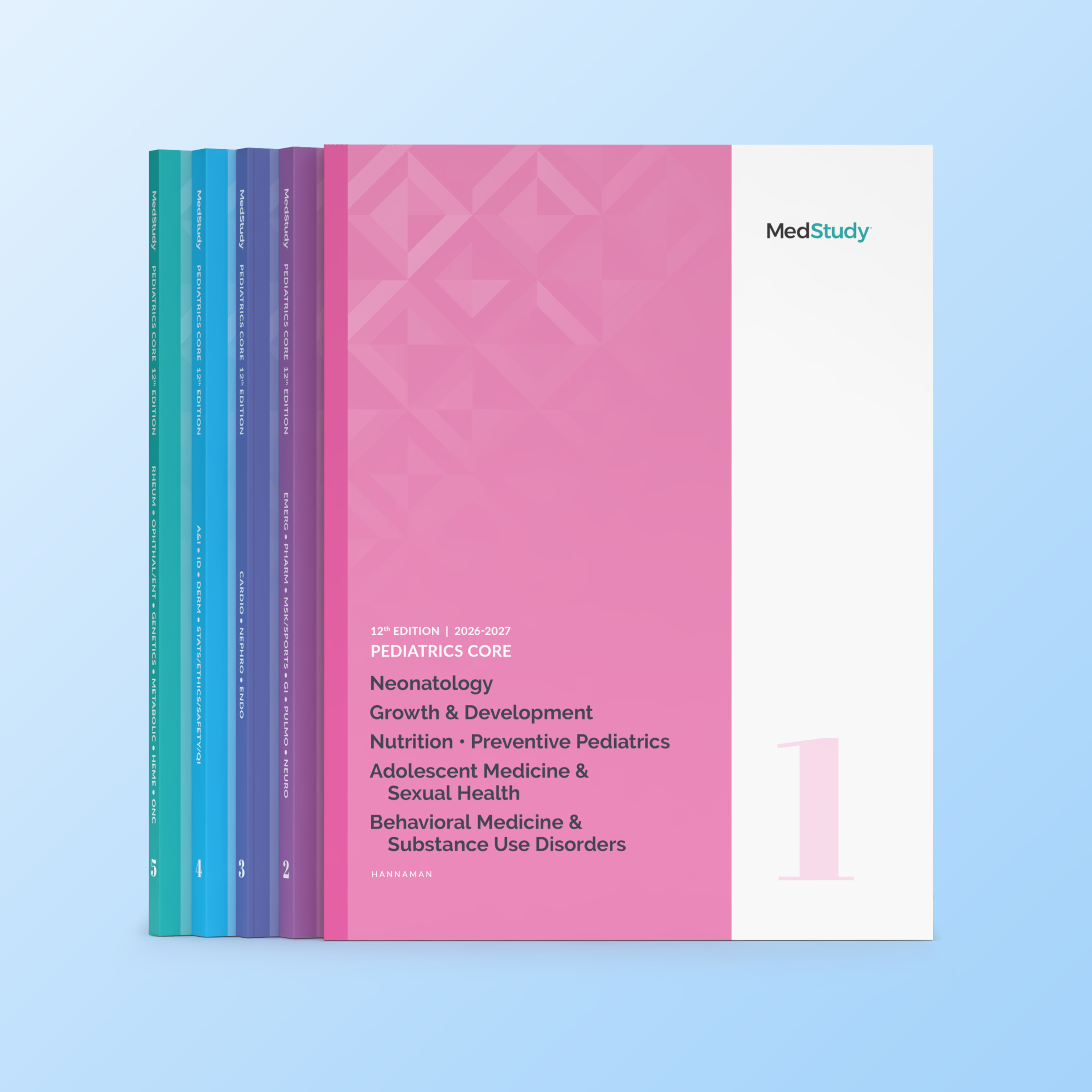
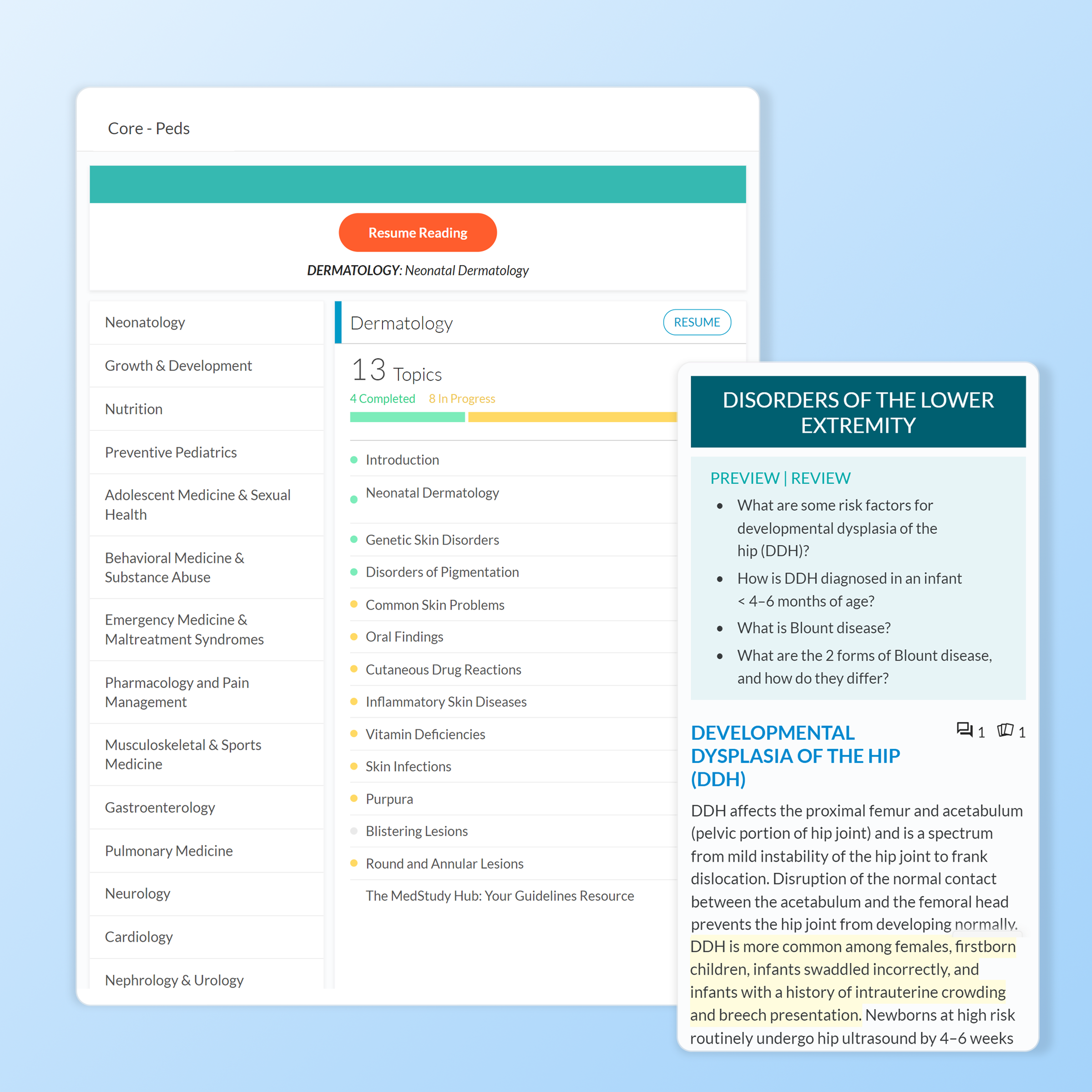
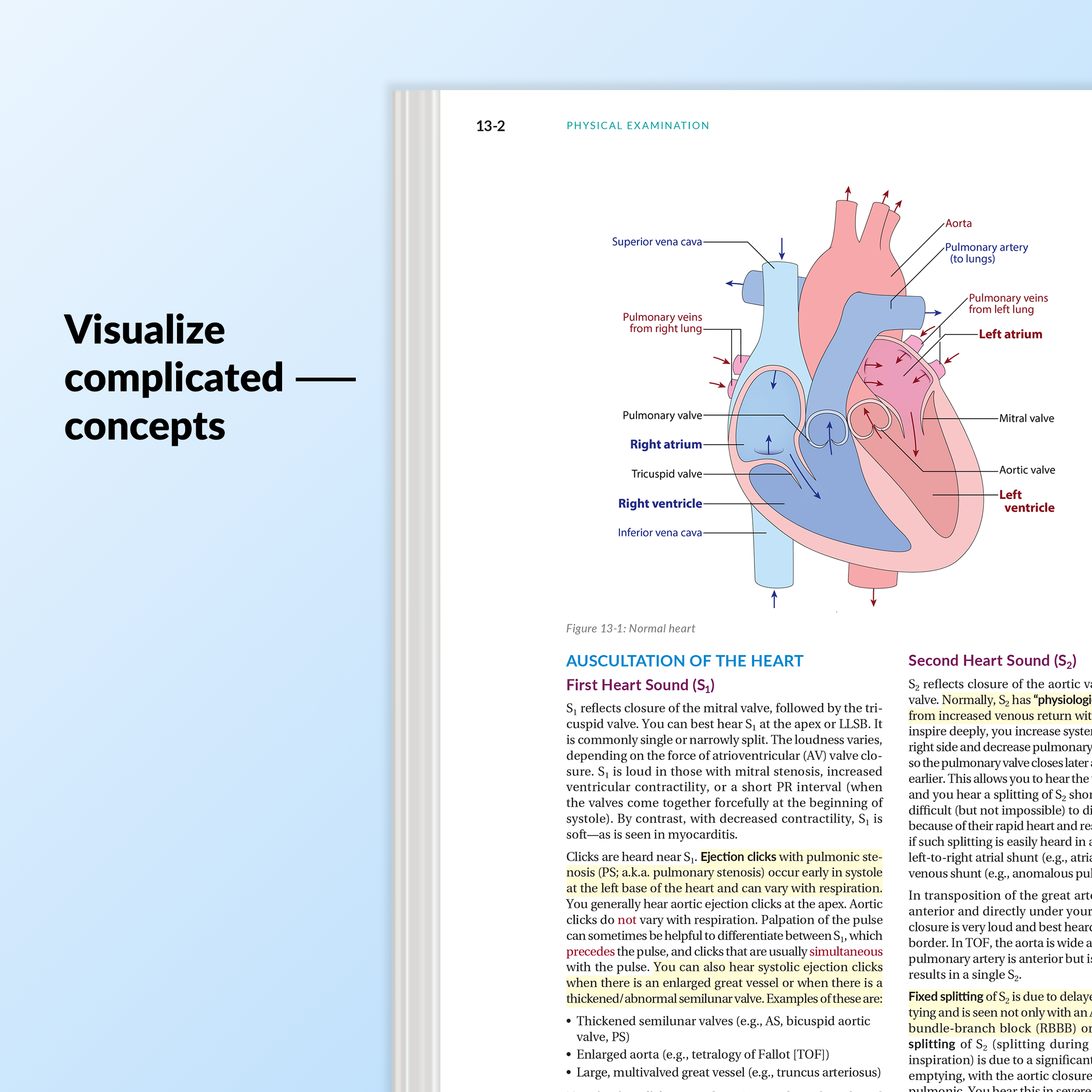
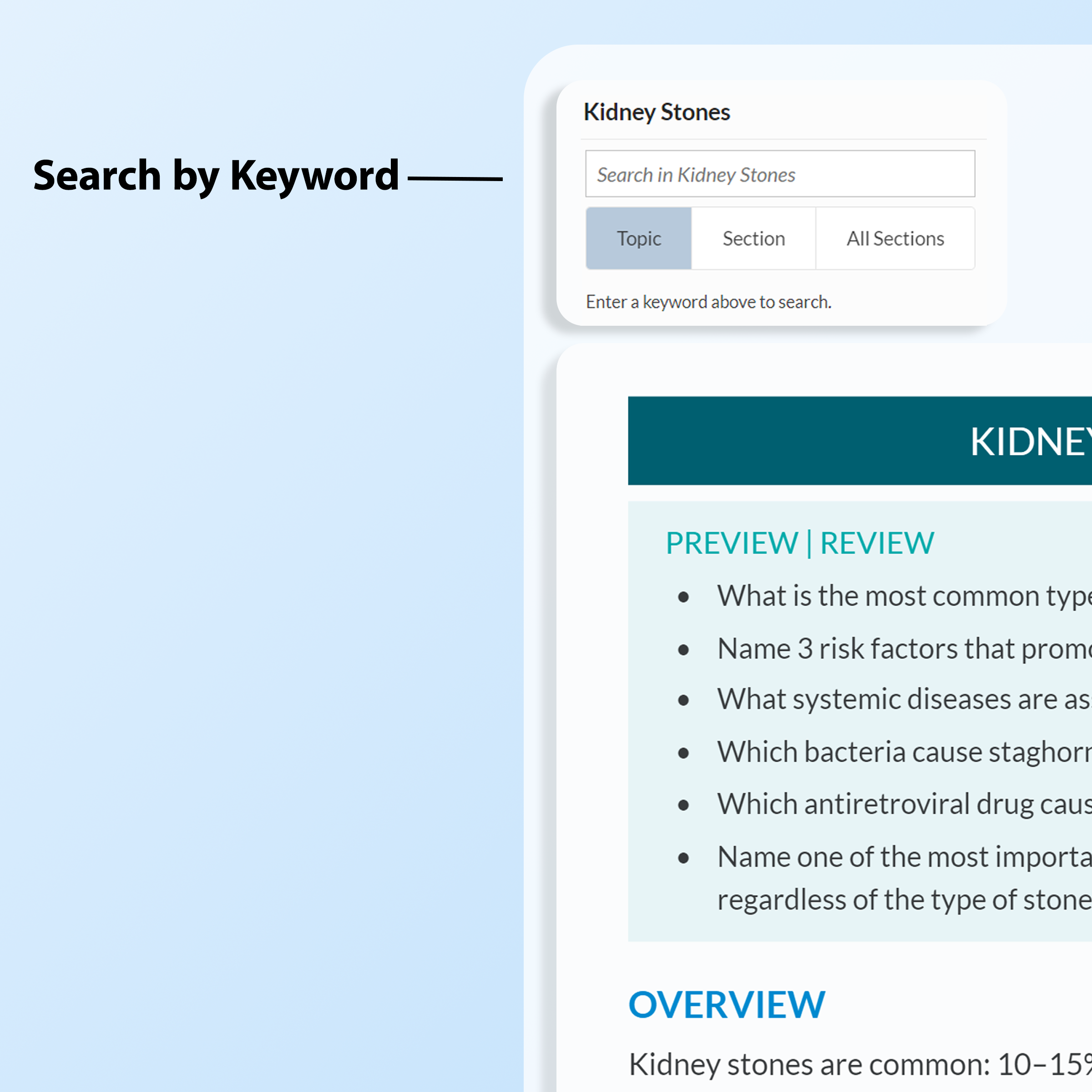

Pediatrics Core
- Regular price
-
$499.00 - Regular price
-
- Sale price
-
$499.00
Flip through a sample from the Cardiology section
-
Karunasri Janga, MD
"It's great! I studied only using MedStudy and passed the boards on first attempt. I strongly recommend it to my colleagues and friends."
-
Sarah Green, MD
"I read the books and did the question bank. I liked that the book had questions because it helped me read more actively."
-
Catherine Kent, MD
"The Core was just what I needed to really step back and review everything. I don't think I would have passed without it."

Set of 5 books
Review every topic for ABP boards
5 volumes written in our trademark style—casual yet concise. Exactly what a competent internist is expected to know.
Great for residency training and perfect for the boards!

2,220+ Preview | Review questions
Prime your brain before reading each section
Questions appear at the beginning of each main topic to prime your brain for the concepts you'll be learning. Find answers highlighted in the text.

interlinked content
Easily test yourself on Core learning
With a single click, you can easily move between topics in the digital Core and associated Q&As or Flashcards.
Read the entire Cardiology section for free
-
26 Cardiology subtopics
-
All Cardiology P|R questions
-
Unlimited access for 30 days
Get 30-day access to the entire Cardiology section of the Pediatrics Study Strong Essentials (includes the Core, Q&As, Flashcards, and Personal Trainer) to unlock even more. No credit card required.
By starting a free trial, you agree to our terms of use.

Study strong essentials
Save $600 when you bundle with Flashcards and Qbank+
Study Strong Essentials combines focused content with evidence-based learning techniques to ensure you achieve and maintain core competency.
Includes everything a competent pediatrician is expected to know
Neonatology
Mortality / Morbidity in Newborns
* Common Terms
* Factors Associated With Neonatal Mortality
The Placenta
* Placental Development
* The Umbilical Cord
* Chorioamnionitis
* Abnormalities of the Placenta
* Issues of Twins and Their Placentas
Prenatal Care
* Well-Mother Health
* Prophylaxis for Group B Streptococcus (GBS)
* Preterm Complications
* Assessing Fetal Health
Cesarean Section (C-Section)
Operative Vaginal Delivery
Fetal-to-Newborn Transitions
* Respiratory Transitions
* Circulatory Transition after Birth-
* Glucose Transitions
* Water Balance
The Delivery Room
* Apgar
* Delivery Room Resuscitation
* Delivery Room Temperature
The Newborn Examination
* Note
* Gestational Age / Size
* Physical Examination
* Crying in the Newborn
* Temperature
* Skin
* Head
* Eyes
* Ears
* Nose
* Mouth
* Neck
* Chest
* Lungs
* Heart
* Abdomen
* Genitalia
* Anus
* Spinal Column
* Extremities
* Neurologic Exam
Neonatal Prophylaxis
* Eye Prophylaxis
* Vitamin K
* Hepatitis B
* Cord Care
* Circumcision
Neonatal Screening
* Glucose
* Hematocrit
* Blood Type
* Inborn Errors of Metabolism
Hemoglobinopathies
* Hearing
* Cyanotic Congenital Heart Disease (CCHD)
* Toxic Substances / Illicit Drugs
Multiple Births
* Epidemiology
* Prenatal Assessment
* Delivery and Perinatal Problems
Small for Gestational Age (SGA)
Teratogens
* Teratogenic Drugs
* Maternal Exposures and Substance Use
* Maternal Diseases
* Maternal Infections
Infants of Mothers with Diabetes
Congenital Infections
* Overview
* Congenital Syphilis
* Sepsis in the Newborn
Neonatal Respiratory Distress
* Transient Tachypnea of the Newborn (TTN)
* Respiratory Distress Syndrome (RDS)
* Group B Streptococcus (GBS)
* Persistent Pulmonary Hypertension of the Newborn (PPHN)
* Apnea-Meconium Aspiration Syndrome (MAS)
* Congenital Diaphragmatic Hernia (CDH)
* Pneumothorax and Pneumomediastinum
* Bronchopulmonary Dysplasia (BPD)
* Pulmonary Hemorrhage in the Newborn
Patent Ductus Arteriosus (PDA)
Gastrointestinal (GI) Disorders in Newborns
* Note
* Meconium Plugs
* Meconium Ileus-Necrotizing Enterocolitis (NEC)
* Malrotation
* Intestinal Atresia
* Newborn Hyperbilirubinemia
Blood Disorders in the Newborn
* Polycythemia
* Hemolytic Disease of the Fetus and Newborn (HDFN)
Hospital Discharge of the Healthy Newborn
Growth & Development
Overview of Growth
* Normal Growth Patterns
* Midparental Height (MPH)
* Growth Charts
* Growth Pattern Variations
Constitutional Growth Delay (CGD)
Failure to Thrive (FTT)
Obesity / Overweight Screening
* Obesity
* Metabolic Syndrome
Head Malformations
Developmental Milestones
* Overview
* Developmental Delay
* Intellectual Disability
* Speech / Language Delay
* Autism Screening
* Extra Questions
School Accommodations and Interventions
* Overview
* Education Plans and Legislation
* Accommodations
Toilet Training
* Overview
* Signs of Readiness
* A Child-Oriented Approach
* Toilet Training Refusal
Discipline
Nutrition
Normal Nutrition
Nutrition, Calorie, and Fluid Requirements
* Overview
* Breastfeeding
* Formula Feeding
* Vitamin and Mineral
Supplementation
* Advancing the Diet
* Enteral Nutrition
* Parenteral Nutrition
Refeeding Syndrome
Nutritional Disorders
* Marasmus
* Kwashiorkor
* Etiology-Based Malnutrition
* Fat-Soluble Vitamin Deficiencies
* Water-Soluble Vitamin Deficiencies
* Pica
Vegetarian and Vegan Diets
Preventive Pediatrics
Screening in Children
* Note
* Newborn Screening
* Vision and Hearing Screening
* Body Mass Index (BMI) Screening
* Blood Pressure (BP) Screening
* Lead Screening
* Iron Deficiency Screening
* Autism Spectrum Disorder Screening
* Urine Screening
* Cholesterol and Lipid Screening
* Tuberculosis (TB) Screening
* Sexually Transmitted Infection (STI) Screening
Dental Care
Sleep Issues
Crying / Colic
Safety and Injury Prevention
* Overview
* Causes of Mortality
* Child Safety Restraints
* Other Safety Items
"The Shots"
* Overview
* Vaccine Administration and Storage
* Live Vaccines
* Adverse Events, Contraindications, and Precautions
* Postexposure Prophylaxis
* Pregnancy
* Vaccine Hesitancy
* The Immunization Schedules
* DTaP / DT / Tdap / Td Vaccine
* Measles, Mumps, Rubella (MMR) Vaccine
* Varicella Vaccine
* Inactivated Poliovirus (IPV) and Oral Poliovirus (OPV)
* Haemophilus influenzae Type b (Hib) Vaccine
* Hepatitis A Vaccine
* Hepatitis B Vaccine
* Pneumococcal Vaccines
* Meningococcal Vaccine
* Rotavirus Vaccine
* Influenza Vaccine
* Human Papillomavirus (HPV) Vaccine
* COVID-19 Vaccines
Immigrant and Internationally Adopted Children
Preventive Measures for International Travel
Appendix — Blood Pressure Charts
Adolescent Medicine & Sexual Health
Special Issues of Adolescents
The Developing Adolescent
* General Considerations
* Adolescent Behavior
* Emancipation and Health Care
* The Adolescent Health Visit
* Eating Disorders
* Self-Injurious Behavior in Adolescents
* Intimate Partner Violence
* Sexual Development
* Contraception
* Sexual Behavior in Children and Adolescents
* Sexual Exploration
Sexually Transmitted Infections (STIs)
* Prevalence of STIs
* Prevention
* Reporting and Confidentiality
* Pregnant Adolescents
* Children with STIs
* Human Immunodeficiency Virus (HIV)
* STIs Characterized by Genital Ulcers
* STIs with Urethritis and Cervicitis
* Disseminated Gonococcal Infection (DGI)
* Infections with Vaginal Discharge
* Pelvic Inflammatory Disease (PID)
* Epididymitis
* Human Papillomavirus (HPV) Infection
* Cervical Cancer Screening
* Proctitis, Proctocolitis, and Enteritis
* Ectoparasitic Infections
* Vaccine-Preventable Sexually Transmitted Infections (STIs)
Behavioral Medicine & Substance Use Disorders
Common Behavioral Issues
* Colic
* Sleep Problems
* Temper Tantrums and Breath Holding
* Stress
* Separation Anxiety
* School Refusal
* School Overachievement
* Repetitive Habits and Behaviors
Psychosocial Issues
* Birth of a Sibling
* Adoption
* Foster Care
* Divorce
* Family Death / Terminal Illness
* Family Chronic Illness
* Impact of Mass Media
* Impact of Racism on Child and Adolescent Health
* Undocumented Immigrants
Disruptive Behaviors
* Oppositional Defiant Disorder (ODD)
* Conduct Disorder
Autism Spectrum Disorder (ASD)
* Overview
* Treatment
Tic Disorders
* Overview
* Tourette Syndrome
* Provisional Tic Disorder
Rett Syndrome
Mental Health Disorders
* Features of Psychotic and Mood Disorders
* Schizophrenia
* Depression
* Bipolar Disorder
* Nonsuicidal Self-Injury (NSSI)
* Anxiety Disorders
* Posttraumatic Stress Disorder (PTSD)
* Obsessive-Compulsive Disorder (OCD)
* Psychosomatic Disorders
* Factitious Disorder Imposed on Another
Attention Deficit Hyperactivity Disorder (ADHD)
* Overview
* Comorbidities
* Etiology
* Clinical Findings
* Laboratory
* Treatment
* Prognosis
Substance Use Disorders (SUDs)
* Overview
* Alcohol
* Nicotine
* Marijuana
* Cocaine
* Psychoactive Drugs
* Synthetic Cathinones (Bath Salts)
* Benzodiazepines (BDZs)
* Barbiturates
* Inhalants
* Hallucinogens
* Androgenic Steroids
* Summary of Key Clinical Findings
Suicide
Emergency Medicine & Maltreatment Syndromes
Poisonings
* Overview
* Initial Management
* Acetaminophen Ingestion
* Salicylate Ingestion
* Ibuprofen Ingestion
* Opiate / Opioid Poisoning
* Antihypertensive Ingestion
* Iron Ingestion
* Anticholinergic Ingestion
* Tricyclic Antidepressant (TCA) Ingestion
* Serotonin Syndrome and Neuroleptic Malignant Syndrome
* Oral Hypoglycemic Agents
* Methemoglobinemia
Environmental Ingestions and Exposures
* Lead
* Carbon Monoxide (CO)
* Cyanide
* Caustic Substance Ingestion
* Hydrocarbon Poisoning
* Ethanol Ingestion
* Methanol Ingestion
* Ethylene Glycol Ingestion
* Organophosphate Poisoning
* Plant Exposures
Foreign Body Ingestion or Aspiration
Bites
* Dog / Cat Bites
* Human Bites
* Snake Bites
* Spider Bites
Laceration and Punctures
Burns
* Overview
* Minor Burn Care
* Major Burn Care
Submersion Injury
Head Injury
* Overview
* Neuroimaging
* Mild Traumatic Brain Injury (mTBI)
Electrical Burns
Ocular Chemical Burns
Chest Wall Trauma
Blunt Abdominal Trauma
Fractures
* Overview
* Greenstick Fracture
* Torus (Buckle) Fracture
* Spiral Fracture
* Clavicle Fracture
* Distal Humerus (Elbow) Fracture
* Fracture Complications
Subluxation of the Radial Head
Shoulder Injuries
Sprains
Brief Resolved Unexplained Event (BRUE)
Shock
Pediatric Advanced Life Support (PALS)
* Overview
* Circulation
* Postarrest Care
Neonatal Resuscitation
Child Maltreatment Syndromes
* Overview
* Neglect
* Physical Abuse
* Sexual Abuse
* Psychological Maltreatment
Management and Prevention of Maltreatment
Pharmacology and Pain Management
Pharmacology
* Overview
* Pharmacokinetics
* Pharmacodynamics
* Bioequivalence
Sedation
* Overview
* Patient Characteristics
* Degrees of Sedation
* Risk Factors for Sedation
* Related Adverse Events (SRAEs)
* SRAEs
* Reduction of SRAEs
* Sedation Agent Profiles
Analgesia
* Overview
* Local and Topical Agent Profiles
* Systemic Treatment Profiles
Musculoskeletal & Sports Medicine
Congenital Disorders
* Torticollis
* Clubfoot
* Intoeing
* Polydactyly
* Sprengel Deformity
* Klippel-Feil Syndrome
* Osteogenesis Imperfecta
* Achondroplasia
* Scoliosis
* Kyphosis
* Pectus Excavatum
* Pectus Carinatum
Back Pain
Disorders of the Lower Extremity
* Causes of Leg Length Discrepancy
* Developmental Dysplasia of the Hip (DDH)
* Blount Disease
Limb Pain
* Overview
* Evaluation of the Limping Child
* Growing Pains
* Bone Neoplasms
* Osteoid Osteoma
* Osgood-Schlatter Disease
* Transient Synovitis
* Legg-Calvé-Perthes Disease
* Slipped Capital Femoral Epiphysis (SCFE)
Heel and Foot Pain
Bone Injuries and Benign Lesions
* Compartment Syndrome
* Growth Plate Injuries
* Bone Lesions
* Osteochondroma
* Traumatic Myositis Ossificans
* Fractures
Preparticipation Physical Evaluation (PPE)
Sports Injury Prevention and Treatment
* Overview
* Heat Illness
* Mild Traumatic Brain Injury (mTBI; Concussion)
* Overuse Injuries
* Sprains and Strains
* Shoulder Dislocation / Subluxation
* Knee Injuries
* Ankle Sprain
Nutritional Requirements
Relative Energy Deficiency in Sport (RED-S)
Performance-Enhancing Substances (PESs)
Gastroenterology
Vomiting
* Overview
* Infant Regurgitation
* Cyclic Vomiting Syndrome (CVS)
* Rumination Syndrome
* Gastroparesis
Abdominal Pain
* Overview
* History / Workup
* Functional Abdominal Pain
Acute Diarrhea
* History / Workup
* Oral Rehydration Therapy
* Feeding During Acute Diarrhea
* Use of Antidiarrheal Agents
Chronic Diarrhea
Constipation
* Overview
* Infant Dyschezia
* Functional Constipation
Esophagus Disorders
* Tracheoesophageal Fistulas (TEFs) and Esophageal Atresias (EAs)
* Achalasia
* Gastroesophageal Reflux (GER)
* Eosinophilic Esophagitis (EoE)
* Infections of the Esophagus
* Caustic Ingestions
* Pill-Induced Esophagitis
* Ingestion of Foreign Bodies
* Esophageal Perforation
* Esophageal Varices
Stomach Disorders
* Pyloric Stenosis
* Erosive and Hemorrhagic Gastropathy
* Nonerosive Gastropathy
* Peptic Ulcer Disease (PUD)
Intestinal Disorders
* Malrotation of the Intestine
* Intussusception
* Meckel Diverticulum
* Congenital Intestinal Atresias
* Gastrointestinal (GI) Duplications
* Meconium Ileus
* Carbohydrate Malabsorption
* Congenital Transport Defects
* Short Bowel Syndrome
* Superior Mesenteric Artery (SMA) Syndrome
* Celiac Disease (Gluten-Sensitive Enteropathy)
* Tropical Sprue
* Whipple Disease
* Appendicitis
* Neutropenic Enterocolitis
Inflammatory Bowel Disease (IBD)
* Overview
* Ulcerative Colitis (UC)
* Crohn Disease
* Treatment
Colonic Polyps and Tumors
* Overview
* Juvenile Polyps and Juvenile Polyposis
* Peutz-Jeghers Syndrome
* Syndromes Linked to PTEN Gene Mutations
* Proteus Syndrome
* Familial Adenomatous Polyposis
Congenital Ventral Abdominal Wall Defects
* Occurrence
* Omphalocele
* Gastroschisis
Anorectal Disorders
* Occurrence
* Male Anorectal Disorders
* Female Anorectal Disorders
* Anorectal Disorders Presenting Similarly in Both Sexes
Hirschsprung Disease
* Occurrence-
* Pathogenesis
* Presentation
* Diagnosis
* Treatment
Disorders of the Exocrine Pancreas
* Note
* Cystic Fibrosis (CF)
* Schwachman-Diamond Syndrome
* Acute Pancreatitis
* Chronic Pancreatitis
Diseases of the Liver and Biliary Tree
* Jaundice Beyond the Neonatal Period
* Congenital Disorders of Liver Structure
* Congenital Anomalies of the Biliary Tree
* Liver Trauma
* Viral Hepatitis
* Metabolic Liver Diseases
* Drug-Induced Liver Injury (DILI)
* Autoimmune Hepatobiliary Disease
* Biliary Atresia
* Cholelithiasis
* Acute Cholecystitis
* Hydrops of the Gallbladder
* Tumors of the Liver and Biliary Tree
Pulmonary Medicine
Normal Respiration
Diagnostic Testing
* Lung Volumes and Pulmonary Function Tests (PFTs)
* Pulse Oximetry
* Blood Gas Analysis
Ventilatory Support
Neonatal Stridor
* Note
* Laryngomalacia
* Subglottic Stenosis
* Vocal Cord Paralysis
* Laryngeal Atresia / Webs
Congenital Disorders of the Lower Respiratory Tract
* Tracheal Disorders
* Pulmonary Hypoplasia
* Congenital Pulmonary Venolobar Syndrome (Scimitar Syndrome)
* Pulmonary Arteriovenous Malformations (PAVMs)
* Pulmonary Sequestrations
* Bronchogenic Cysts
* Congenital Pulmonary Airway Malformation (CPAM)
* Diaphragm Malformations
Neuromuscular Respiratory Failure
Stridor Beyond the Neonatal Period
* Infection
* Paradoxical Vocal Cord Dysfunction (VCD)
Infections of the Upper Respiratory Tract
* Note
* Croup (Laryngotracheobronchitis)
* Epiglottitis
* Bacterial Tracheitis
Infections of the Lower Respiratory Tract
* Bronchiolitis
* Pneumonia — General Considerations
* Viral Pneumonia
* Acute Bacterial Pneumonia
* Atypical Pneumonias
* Fungal Pneumonias
* Recurrent Pneumonia
* Tuberculosis (TB)
Asthma
* Overview
* Classification
* Comorbidities and Triggers
* Treatment
* Acute Exacerbation
Differential Diagnosis of Wheezing
Nonasthma Causes of Chronic Cough
* Overview
* Common Causes
* Cryptogenic Organizing Pneumonia (COP)
* Bronchiolitis Obliterans (BO)
* Bronchiectasis
Sudden Infant Death Syndrome (SIDS)
Cystic Fibrosis (CF)
* Overview
* Manifestations
* Diagnosis
* Treatment
* Complications
Primary Ciliary Dyskinesia (PCD)
α1-Antitrypsin Deficiency (AATD)
* Overview
* Diagnosis
* Treatment
Hemoptysis
* Overview
* Idiopathic Pulmonary Hemosiderosis (IPH)
Interstitial Lung Diseases (ILDs)
* Overview
* Lymphocytic Interstitial Pneumonia (LIP)
* Sarcoidosis
* Pulmonary Alveolar Proteinosis
The Lungs in Autoimmune Diseases
* Overview
* Systemic Lupus Erythematosus (SLE)
* Scleroderma
* Sjögren Syndrome
* Granulomatosis with Polyangiitis (GPA)
* Anti–Glomerular Basement Membrane (Anti-GBM)
* Disease with Pulmonary Hemorrhage
Appendix — Asthma Treatment Regimens
Neurology
Congenital Anomalies of the Central Nervous System (CNS)
* Neural Tube Defects (NTDs)
* Syringomyelia
* Hydrocephalus
* Chiari Malformation
* Klippel-Feil Syndrome
* Migrational Anomalies
* Polymicrogyria
* Lissencephaly
* Schizencephaly
* Holoprosencephaly
* Agenesis of the Corpus Callosum
Cerebral Palsy (CP)
* Definitions
* Etiology
* Types of CP
* Seizures and Intellectual Disability
* Diagnosis
* Treatment
Chorea
Narcolepsy
Cerebrovascular Diseases
* Overview
* Clinical Features
* Differential Diagnosis
* Ischemic Stroke
* Hemorrhagic Stroke
* Cerebral Vein Thrombosis
Injury / Trauma to the Central and Peripheral Nervous Systems
* Occurrence
* Scalp Injuries
* Skull Fractures
* Parenchymal Injuries
* Spinal Cord Injury
* Common Peripheral Nerve Injuries
Cranial Nerve (CN) Abnormalities
* CN Review
* Facial Nerve Palsy
* Marcus Gunn Phenomenon
Seizure Disorders
* Occurrence
* Generalized Seizures
* Focal Seizures
* Infantile Spasms
* Lennox-Gastaut Syndrome
* Posttraumatic Seizures
* Neurocutaneous Syndromes
* Other Seizure Types
* Management
* Drug Therapy and Side Effects
* Common Epilepsy Questions
* Status Epilepticus
* Neonatal Seizures
* Febrile Seizures
Headache
* Etiologies
* Primary Headache Disorders
* Organic Headaches
* CT / MRI Evaluation of Headaches
Neuromuscular Diseases
* Overview
* Spinal Muscular Atrophy (SMA)
* Duchenne Muscular Dystrophy (DMD)
* Becker Muscular Dystrophy
* Myasthenia Gravis
* Guillain-Barré Syndrome
* Charcot-Marie-Tooth Disease
* Botulism
* Transverse Myelitis
* Multiple Sclerosis (MS)
Ataxia
* Overview
* Acute Cerebellar Ataxia of Childhood
* Friedreich Ataxia
* Ataxia Telangiectasia
Other Diseases of the Central Nervous System (CNS)
Cardiology
Physical Examination
* Overview
* Skin
* Arterial Pulses
* Venous Pulses
* Inspection and Palpation
* Auscultation of the Heart
* Common Pediatric Murmurs
The 15-Lead Electrocardiogram (ECG)
* The Basics
* Axis Deviations
* Rates and Intervals
* Waveforms and Segments
* Ventricular Hypertrophy
Chest Pain
* Overview
* Acute-Onset, Severe Chest Pain
* Chronic and Recurrent Chest Pain
Syncope
Cardiovascular Preparticipation Physical Evaluation
Preventive Cardiology
Arrhythmias
* Mechanisms of Arrhythmias
* Clinical Manifestations of Cardiac Arrhythmias / Dysrhythmias
* Sinus Bradycardia, Sinus Arrhythmia, and Extrasystoles
* Supraventricular Arrhythmias
* Ventricular Arrhythmias
* Cardiac Pacing
Sick Sinus Syndrome
Antiarrhythmic Drugs (AADs)
Conduction Disorders
* Long QT Syndrome
* Atrioventricular (AV) Blocks
* Heart Block Treatment
* Bundle-Branch Block (BBB)
Occurrence / Causes of Congenital Heart Disease
Left-to-Right Shunts
* Overview
* Ventricular Septal Defect (VSD)
* Patent Ductus Arteriosus (PDA)
* Patent Foramen Ovale (PFO)
* Atrial Septal Defect (ASD)
* Complete AV Canal Defect
* Pulmonary Hypertension
* Eisenmenger Syndrome
Right-to-Left Shunts
* Overview
* Tetralogy of Fallot (TOF)
* Transposition of the Great Arteries
* Tricuspid Atresia
* Pulmonary Atresia With Intact Ventricular Septum
Other Cyanotic Lesions — “Mixing” Lesions
* Overview
* Truncus Arteriosus
* Total Anomalous Pulmonary Venous Return (TAPVR)
* Hypoplastic Left Heart Syndrome (HLHS)
Malpositions
Obstructive Lesions
* Coarctation of the Aorta (CoA)
* Aortic Stenosis (AS)
* Supravalvular AS
* Pulmonic Stenosis (PS; Pulmonary Stenosis)
* Peripheral Branch Stenosis
* Mitral Stenosis
* Tricuspid Stenosis
* Hypertrophic Cardiomyopathy (HCM)
Regurgitant Lesions
* Aortic Regurgitation
* Mitral Regurgitation (MR)
* Mitral Valve Prolapse (MVP)
* Pulmonic Regurgitation
* Tricuspid Regurgitation
* Ebstein Anomaly (EA)
Coronary Artery Anomalies
* Anomalous Origin of the Left Coronary Artery
* Anomalous Origin of the Left or Right Coronary Artery From the Aorta
Vascular Rings and Slings
Rheumatic Fever (RF)
* Causes / Signs and Symptoms
* Manifestations
* Proof of Group A Streptococcus (GAS)
* Treatment
* Prognosis
Endocarditis
* Infective Endocarditis
* Antibiotic Prophylaxis for Infective Endocarditis
Kawasaki Disease (KD)
Myocarditis
Cardiomyopathy
* Overview
* Dilated Cardiomyopathy
* Hypertrophic Cardiomyopathy
* Restrictive Cardiomyopathy
Pericardial Diseases
* Pericarditis
* Constrictive Pericarditis
* Postpericardiotomy Syndrome
Heart Failure (HF)
* Overview
* Symptoms
* Diagnosis
* Treatment
Nephrology & Urology
Normal Renal Physiology and Diuretics
* Overview
* Glomerulus
* Proximal Convoluted Tubule
* Loop of Henle
* Distal Convoluted Tubule
* Collecting Duct
* Diuretics — Notes To Know!
Renal Testing
* Urinalysis (U/A)
* Kidney Function
* Imaging
* Kidney Biopsy
* Serum pH
Composition of Body Fluids
* Total Body Water (TBW)
* Fluid Compartments
* Osmolality and Volume Status
* Normal Fluid Requirements
Electrolyte Abnormalities
* Sodium
* Potassium
* Calcium
Acid-Base Disorders
* Respiratory vs. Metabolic Disorders
* Mechanisms
* Anion Gaps
* Osmol Gap (OG)
* Analysis of Acid-Base Problems
* Metabolic Alkalosis
* Metabolic Acidosis
Hematuria
Glomerulonephritis (GN)
* Overview
* Acute Postinfectious Glomerulonephritis (PIGN)
* Membranoproliferative Glomerulonephritis (MPGN)
* Lupus Nephritis
* Rapidly Progressive Glomerulonephritis (RPGN)
* Immunoglobulin A (IgA) Nephropathy
* IgA Vasculitis Nephritis (IgAV Nephritis)
* Anti–Glomerular Basement Membrane Disease (Anti-GBM Disease)
* Antineutrophil Cytoplasmic Antibody (ANCA)
* Positive Focal Necrotizing Glomerulonephritis
Proteinuria
Nephrotic Syndrome
* Overview
* Complications
* Minimal Change Disease (MCD)
* Focal Segmental Glomerulosclerosis (FSGS)
* Membranous Nephropathy
Hemolytic Uremic Syndrome (HUS)
* Occurrence
* Clinical Manifestations
* Laboratory Findings
* Treatment
Renal Tubular Acidosis (RTA)
* Overview
* Distal (Type 1) RTA
* Proximal (Type 2) RTA
* Type 4 RTA (Hypoaldosteronism)-Types of RTA — Review
* RTA Scenarios
Hereditary Glomerulopathies
* Alport Syndrome
* Thin Basement Membrane Nephropathy
* Denys-Drash Syndrome
* Fabry Disease
* Nail-Patella Syndrome
Cystic Diseases of the Kidneys
* Polycystic Kidney Disease
* Nephronophthisis (NPH)
* Tuberous Sclerosis Complex (TSC)
* Medullary Sponge Kidney
* Bardet-Biedl Syndrome
* Congenital Cystic Anomalies of the Kidney
Tubular and Interstitial Diseases
* Overview
* Renal Tubular Acidosis
* Acute Interstitial Nephritis (AIN)
* Chronic Interstitial Nephritis (CIN)
Other Drug-Induced Nephropathies
Hypertension (HTN)
Acute Kidney Injury (AKI)
* Overview
* Prerenal AKI
* Intrinsic (Intrarenal) AKI
* Obstructive (Postrenal) AKI
* Tips to Etiology of AKI
* Treatment
Chronic Kidney Disease (CKD)
* Overview
* Clinical Manifestations
* Diagnosis
* Management
* Dialysis
* Kidney Transplant
Pregnancy and Kidney Disease
Kidney-Associated Anemias
Kidney Stones
* Overview
* Calcium
* Struvite
* Cystine
* Uric Acid
* Treatment for Ureteral Obstruction
Urinary Tract Infections (UTIs)
Normal Development and Urologic Abnormalities
* Normal Renal Development
* Prenatally Diagnosed Hydronephrosis
* Kidney and Ureter Anomalies
* Vesicoureteral Reflux (VUR)
* Bladder and Urethral Abnormalities
* Disorders of Voiding
* Inguinal Swelling and Masses
* Male Genital System Abnormalities
* Female Genital System Abnormalities
Endocrinology
Hypothalamus and Pituitary Disorders
* Overview
* Hormones of the Hypothalamus and Pituitary
* Hypopituitarism and Growth Hormone (GH) Deficiency
* Diabetes Insipidus (DI)
* Endocrine Causes of Hyponatremia
* Primary Hyperpituitarism
Puberty
* The Pituitary and the Hypothalamic Pituitary-Gonadal (HPG) Axis
* Clinical Physiology
* Precocious Puberty
Thyroid Disorders
* Normal Thyroid Physiology
* Thyroid Function Tests (TFTs)
* Thyroxine-Binding Globulin (TBG)
* Scans / Ultrasound
* Thyroglossal Duct Cyst
* Hypothyroidism
* Hyperthyroidism
* Thyroid Cancer
Parathyroid Disorders
* Overview
* Hypoparathyroidism
* Pseudohypoparathyroidism
* Rickets
* Hyperparathyroidism
* Familial Hypocalciuric Hypercalcemia (FHH)
* Granulomatous Disease
* Hypercalcemia of Malignancy
Adrenal Disorders
* The Hypothalamic-Pituitary-Adrenal (HPA) Axis
* Adrenal Insufficiency
Congenital Adrenal Hyperplasia (CAH)
* Overview
* Causes
* Clinical Manifestations
* Laboratory Findings
* Diagnosis
* Prenatal Diagnosis and Treatment
* Postdelivery Treatment
Cushing Syndrome
* Overview
* Adrenocorticotropic Hormone (ACTH)
* Independent Cushing Syndrome
* ACTH
* Dependent Cushing Syndrome
* Clinical Manifestations
* Laboratory Findings
* Differential Diagnosis
* Treatment
Hyperaldosteronism
* Overview
* Primary Hyperaldosteronism
* Secondary Hyperaldosteronism
Pseudohyperaldosteronism
Pheochromocytoma (Pheo)
* Overview
* Clinical Manifestations
* Diagnosis
* Treatment
Male Hypogonadism
* Primary Hypogonadism
* Secondary (Hypogonadotropic) Hypogonadism
Female Hypogonadism
* Note
* Primary Hypogonadism
* Secondary Hypogonadism
* Polycystic Ovary Syndrome (PCOS)
Gynecomastia
Differences of Sexual Development (DSDs)
* Overview
* 46,XX DSDs
* 46,XY DSDs
* Ovotesticular DSD
* Congenital Genital Malformations
Polyuria in a Child
Diabetes Mellitus (DM)
* Overview
* Type 1 DM
* Type 2 DM
* Metabolic Syndrome
* Monogenic Diabetes — Maturity-Onset Diabetes of Youth (MODY)
* Insulin Resistance Syndromes
Hypoglycemia
Allergy & Immunology
Hypersensitivity Reactions
* Overview
* Type 1 — Immediate Hypersensitivity Reaction
* Type 2 — Cytotoxic Hypersensitivity
* Type 3 — Immune Complex (IC) Hypersensitivity
* Type 4 — Cell-Mediated Hypersensitivity
Allergic Disorders
* Overview
* Anaphylaxis
* Urticaria
* Angioedema
* Asthma
* Allergic Rhinitis and Conjunctivitis
* Immunoglobulin E (IgE)
* Mediated Food Allergy
* Non-IgE-Mediated Food Allergy
* Insect Allergy
* Latex Allergy
* Radiocontrast Media (RCM) Reactions
* Allergy Testing and Other Laboratory Tests
Adverse Drug Reactions
* Overview
* Immunoglobulin E (IgE)
* Mediated Penicillin Allergy
* Vancomycin Reactions
* Drug Reaction with Eosinophilia and Systemic Symptoms (DRESS) Syndrome
* Fixed Drug Eruption
* Stevens-Johnson Syndrome (SJS) / Toxic Epidermal Necrolysis (TEN)
* Serum Sickness (SS) and Serum Sickness–Like Reactions (SSLRs)
Mastocytosis
Eczema
* Atopic Dermatitis (AD)
* Contact Dermatitis
Review of the Immune System
* Note
* The Innate Immune System
* The Adaptive Immune System
* Innate vs. Adaptive Immunity
* Innate and Adaptive Overlap
* Innate-Like Cells
* Cells of the Immune System
* Cell Recognition and Communication
Human Leukocyte Antigens (HLAs)
Lymphoid Cells
* Lymphocytes
* Natural Killer (NK) Cells
Myeloid Cells
Antibodies
Complement
* Overview
* The 3 Complement Pathways
* Common Terminal Pathway — Membrane Attack Complex (MAC)
Immunodeficiencies
* Overview
* Primary B-Cell Immunodeficiencies
* Primary T-Cell Immunodeficiencies
* Combined B- and T-Cell Immunodeficiencies
* Phagocyte Disorders
* Complement Disorders
* Screening Tests for Immunodeficiencies
* Vaccine Use in Immunocompromised Children
Infectious Disease
Congenital and Perinatal Infections
* Overview
* Toxoplasmosis
* Syphilis
* Rubella
* Cytomegalovirus (CMV)
* Herpes Simplex Virus (HSV)
* Human Parvovirus B19
* Varicella
* Enterovirus
* Group B Streptococcus (GBS)
* Listeria
* Congenital Zika Syndrome
Infectious Disease Syndromes
* Fever Without a Source (FWS) in Infants and Children
* Fever of Unknown Origin (FUO)
* Lymphadenopathy
* Sepsis
* Central Nervous System (CNS) Infections
* Gastrointestinal (GI) Infections
* Genitourinary and Sexually Transmitted Infections
* Soft Tissue Infections
* Bone and Joint Infections
* Infective Endocarditis (IE)
* Health Care–Associated (Nosocomial) Infections
Vaccines
Prevention of Infectious Diseases
* Note
* Child Care Centers
* Hospital and Office Infection Control
* Infections Transmitted via Breast Milk
Evaluation of International Adoptees
* Overview
* Immunizations
Bacteria
* Gram-Positive Cocci
* Gram-Positive Rods
* Gram-Negative Cocci
* Gram-Negative Coccobacilli
* Gram-Negative Rods
* Atypical Organisms
* Gram-Variable Bacteria
* Anaerobes
* Acid-Fast Bacteria
Spirochetes
* Syphilis
* Leptospirosis
* Lyme Disease
Fungi
* Overview
* Candida
* Cryptococcus
* Coccidioides, Histoplasma, and Blastomyces
* Aspergillosis
* Dermatophytes
* Malassezia
* Sporotrichosis
* Mucormycosis
* Pneumocystis jiroveci
Parasites
* Classification
* Protozoa
* Helminths
* Testing for Parasitic Diseases
Viruses
* Herpes viruses
* Rubella (German Measles)
* Rubeola (Measles)
* Retroviruses
* Respiratory Viruses
* Enteroviruses
* Polio
* Rotavirus
* Calcivirus
* Hepatitis Viruses
* Rabies
* Mumps
* Parvovirus B19
* Arboviruses
* Chikungunya Virus
* Dengue Fever
* Zika Virus
* Hantavirus
* Ebola Virus
* Slow Viruses
* Prion Diseases
HIV and AIDS
* Note
* Virus Structure and Life Cycle
* Prevalence and Transmission
* Signs and Symptoms
* Diagnosis
* Treatment of HIV Infection
Antibiotics
* Overview
* Inhibitors of Cell Wall Synthesis and Function
* Inhibitors of Protein Synthesis
* Inhibitors of DNA Synthesis and Function
* Antibiotics and the Pregnant or Breastfeeding Woman
Antibiotic Overuse
Antiviral Agents
Antifungal Agents
* Polyenes
* Imidazoles
* Triazoles
* Echinocandins
* Other Systemic Antifungals
* Other Topical Antifungals
Antiparasitic Drugs
Dermatology
Neonatal Dermatology
* Aplasia Cutis Congenita
* Rashes
* A Few Infectious Rashes
* Vascular Abnormalities
* Pigmented Lesions
Genetic Skin Disorders
* Ichthyoses
* Genetic Pigmentation Disorders
* Neurocutaneous Disorders
* Epidermolysis Bullosa (EB)
* Ehlers
* Danlos Syndrome
* Genetic Disorders of the Hair, Nails, Sweat Glands, Sebaceous Glands, and Teeth
Disorders of Pigmentation
* Nevi
* Vitiligo
* Lichen Striatus
* Lichen Nitidus
* Lichen Sclerosus
* Acanthosis Nigricans
* Hyperpigmentation
* Mastocytosis
Common Skin Problems
* Atopic Dermatitis
* Seborrheic Dermatitis
* Intertrigo
* Contact Dermatitis
* Infantile Acne
* Acne Vulgaris
* Acne Rosacea
* Alopecia
* Hidradenitis Suppurativa
* Terra Firma
* Forme Dermatosis (TFFD)
* Keratolysis Exfoliativa
Oral Findings
Cutaneous Drug Reactions
* Overview
* Stevens-Johnson Syndrome (SJS) and Toxic Epidermal Necrolysis (TEN)
Inflammatory Skin Diseases
* Psoriasis
* Reactive Arthritis
* Cutaneous Lupus
* Neonatal Lupus
* Sarcoidosis
* Erythema Nodosum (EN)
* Pyoderma Gangrenosum (PG)
* Juvenile Dermatomyositis (JDM)
* Vasculitis
* Pityriasis Lichenoides Et Varioliformis Acuta (PLEVA)
Vitamin Deficiencies
* Hyperpigmentation
* Zinc Deficiency
* Eruption Seen in Cystic Fibrosis
* Biotin Deficiency
* Essential Fatty Acid Deficiency
Skin Infections
* Bacterial Infections
* Rickettsial Infections
* Spirochetal Infections
* Viral Infections
* Fungal Infections
* Parasitic Infections
Purpura
* Overview
* Hemostasis Abnormalities
* Defects in Vascular Integrity
Blistering Lesions
* Pemphigus Vulgaris
* Porphyria Cutanea Tarda (PCT)
* Photosensitivity Reactions
* Dermatitis Herpetiformis (DH)
* Papular Urticaria
* Erythema Multiforme (EM)
* Linear IgA Bullous Dermatosis
Round and Annular Lesions
* Granuloma Annulare (GA)
* Nummular Eczema
* Pityriasis Rosea
Biostatistics, Ethics, Patient Safety, and Quality Improvement
Biostatistics
* Diagnostic Testing and Screening
* Study Designs and Data Analysis
Evidence-Based Medicine
* Formulating a Clinical Question
* Searching for Evidenc
* Critical Appraisal of the Literature
* Applying the Evidence
Ethics
* Autonomy, Beneficence, and Rights
* Special Medical Circumstances
Quality and Safety
* Clinical Quality Measurements
* Prevention Strategies to Reduce Medical Errors
* Patient Experience
Rheumatology
Juvenile Idiopathic Arthritis (JIA)
* Terminology / Occurrence
* JIA Types
* Differential Diagnosis
* Treatment
* Outcomes
Arthritis Associated with Inflammatory Bowel Disease (IBD)
Infection-Related Arthritis
* Infectious Arthritis
* Reactive Arthritis
Vasculitides
* Overview
* Small-Vessel Vasculitides
* Medium-Vessel Vasculitides
* Large-Vessel Vasculitis
* Vasculitides of > 1 Vessel Size
Multisystem Inflammatory Syndrome in Children (MIS-C)
Systemic Lupus Erythematosus (SLE)
* Overview
* Diagnosis
* Treatment
* Prognosis
Mixed Connective Tissue Disease (MCTD)
Sjörgren Syndrome (SS)
Autoimmune Myopathies
* Overview
* Juvenile Dermatomyositis (JDM)
* Juvenile Polymyositis
Scleroderma
* Scleroderma Disorders
* Localized Scleroderma
* Juvenile Systemic Sclerosis (JSSc)
Sarcoidosis
Pain Syndromes
* Growing Pains
* Hypermobility Syndrome
* Amplified Musculoskeletal Pain Syndromes (AMPS)
Amyliodosis
Periodic Fever Syndromes
* Overview
* Periodic Fever, Aphthous Stomatitis, Pharyngitis and Cervical Adenitis (PFAPA) Syndrome
* Familial Mediterranean Fever (FMF)
* Hyper–Immunoglobulin D Syndrome (HIDS)
* Cryopyrin-Associated Periodic Syndromes (CAPS)
* Other Causes of Periodic Fevers
Ophthalmology & ENT
Normal Visual Development
* Anatomy of the Eye
* Some Important Basics
Eye Disorders
* Overview
* Cataracts
* Retinopathy of Prematurity (ROP)
* Dacryostenosis (Nasolacrimal Duct Obstruction)
* Stye / Chalazion
* Strabismus
* Amblyopia
* Color Vision Defects
* Cortical Visual Impairment
* Nystagmus
* Optic Nerve Hypoplasia
* Glaucoma
* Painful Erythematous Eye
* Preseptal and Orbital Cellulitis
* Papilledema
* Retinoblastoma
* Subconjunctival Hemorrhage
* Hyphema
* Orbital Blowout Fracture
Ear Disorders
* Anatomy of the Ear
* Preauricular Sinuses and Pits
* External Ear
* Middle Ear
* Hearing Problems
* Tympanograms
Congenital Disorders of the Nose
* Choanal Atresia
Acquired Disorders of the Nose
* Nasal Foreign Body
* Epistaxi
* Nasal Polyps
* Nasal Fractures
* Nasal Septal Hematoma
Congenital Disorders of the Mouth and Pharynx
* Cleft Lip and Palate
* Lingual Ankyloglossia (Tongue-Tie)
* Lingual Thyroid
* Thyroglossal Duct Cysts
Teeth
Infections of the Mouth, Nose, Pharynx, and Upper Respiratory Tract
* The Common Cold
* Acute Sinusitis
* Chronic Rhinosinusitis
* Submandibular Space Infection (Ludwig Angina)
* Acute Pharyngitis
* Peritonsillar Abscess (PTA)
* Retropharyngeal Abscess
* Tonsillectomy
* Adenoidectomy
Neck
* Cervical Lymphadenopathy (LA)
* Laryngitis / Hoarseness
* Neck Mass
Obstructive Sleep Apnea (OSA)
Genetics
Key Definitions in Genetic Disorders
Risks of Genetic Disease and Diagnostic Testing
* Genetic Disease Risk Factors
* Prenatal Testing
* Postnatal Diagnostic Testing
Chromosomal Defects
* Overview
* Autosomal Trisomy Syndromes
* Sex Chromosome Syndromes
* Microdeletion Syndromes
* Duplication
Single Gene Defects
* Patterns of Inheritance
Multifactorial Inheritance
Twins Facts
Genetic Conditions Organized by Presenting Symptoms
* Poor Growth / Short Stature
* Bone Marrow Dysfunction
* Chromosomal Instability Syndromes
* Craniofacial Malformations
* Skeletal Dysplasias
* Bone Fragility Disorders — Osteogenesis Imperfecta (OI)
* Connective Tissue Disorders
* Neurocutaneous Syndromes
* Familial Cancer Syndromes
* Congenital Anomaly Syndromes
The MedStudy Hub: Your Guidelines and Review Articles Resource
Appendix — Congenital Anomaly Syndromes
Metabolic Disorders
Inborn Errors of Metabolism (IEMs)
* Metabolism Review
* Causes
* Inheritance Patterns
* Mitochondrial Inheritance
Intoxications
* Overview
* Presentations
* Disorders of Amino Acid Metabolism
* Urea Cycle Disorders
* Organic Acidemias
* Sugar Intolerances
Energy Utilization Defects
* Overview
* Presentation
* Defects in Fat Metabolism
* Glycogen Storage Diseases (GSDs)
* Mitochondrial DNA (mtDNA) Disorders
Complex-Molecule Defects
* Overview
* Lysosomal Storage Disorders
* Sphingolipidoses
* Peroxisomal Disorders
* Disorders of Mineral Absorption or Metabolism
* Purine Disorders
* Disorders of Lipids and Lipoproteins
Newborn Screening (NBS)
Hematology
Developmental Changes of Red Blood Cells (RBCs)
* Sites of Blood Formation
* RBC Indices
* Production Rates and Normal Values
* Hemoglobin
* Oxygen Transport
Anemia
* Normal Erythropoiesi
* Clinical Manifestations
* Laboratory Results
* Etiology
Stem Cell Disorders
* Aplastic Anemia
* Fanconi Anemia
* Red Cell Aplasia
White Blood Cell (WBC) Disorders
* Neutropenia
* Disorders of Neutrophil Function
* Disorders of Eosinophils
* Disorders of Basophils
Hemostasis
* Hemostatic Process
* Normal Clotting Sequence
* Clot Limitation and Dissolution
* Clinical Evaluation of Bleeding Disorders
* Lab Tests in Bleeding Disorders
* Disorders of Primary Hemostasis
* Disorders of Secondary Hemostasis
* Thrombotic Disorders
* Anticoagulation Treatment
* Transfusion Treatment
Oncology
Cancer Incidence
Hematologic Malignancies
* Leukemia
* Lymphoma
Tumors of the Central Nervous System (CNS)
* Overview
* Epidemiology of Brain Tumors
* Presentation
* Diagnosis
* Treament
* Glioma
* Medulloblastomas
* Ependymoma
* Germ Cell Tumors (GCTs)
* Craniopharyngioma
* Meningioma
* Spinal Cord Compression from a Mass
Neuroblastoma
* Occurrence
* Pathology
* Presentation
* Diagnosis
* Treatment
* Prognostic Indicators
Wilms Tumor
* Overview
* Pathology and Staging
* Presentation
* Treatment
Rhabdomyosarcoma
* Occurrence
* Pathology
* Presentation
* Diagnosis
* Treatment
Retinoblastoma
* Occurance
* Pathology
* Presentation
* Diagnosis
* Treatment
Bone Neoplasms and Benign Tumors
* Overview
* Osteosarcoma
Affordable options for residency programs
One of our Program Partners will work with you 1-on-1 to meet your specific learning and budget goals.
Pediatrics Core FAQs
What's the difference between the print and digital formats?
PRINT:
Five full-color books to flip through, highlight, and write in will arrive on your doorstep with a beautiful shelf case for easy display. The books are yours to keep. Use the index to flip to the section you’re looking for. Use these books in internet deserts. Not directly, but cross-references exist in Q&As, flashcards, and more.
DIGITAL:
Our Digital Core flies through space and lands in your myMedStudy account. Digital Core is accessible for three years. View instant search results to quickly and easily find what you need. Use Digital Core through myMedStudy on every device with internet access. Yes, content is directly interlinked to Q&As and digital Flashcards (purchase separately). Digital Core receives ongoing updates.
How do I claim CME? Can I claim incremental CME?
There are 150 CME credits & MOC points available with this Core.
Log in to your MedStudy account and take a post-test in order to claim the CME credits and MOC points.
You can claim CME and MOC in chunks. Just make sure to claim before 7/15/26.
How current is the content?
The digital Core receives ongoing updates.
Reviews
Pediatrics Core
I just started out residency and I came from a system that is nothing like the US. Medstudy has helped me learn the basics and I am confident that with continued hardworking I can master this.
Welcome to residency! We’re cheering you on every step of the way. You’ve got this Nnamdi!
Delivered in time
Pediatrics Digital Core
It's great! I studied only using Medstudy and passed the boards on first attempt. I strongly recommend it to my colleagues and friends.
- Choosing a selection results in a full page refresh.


